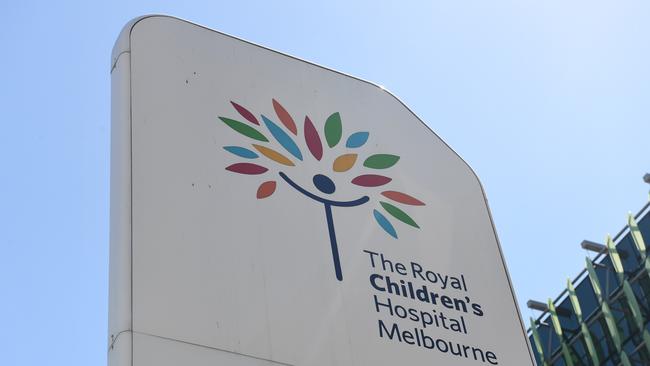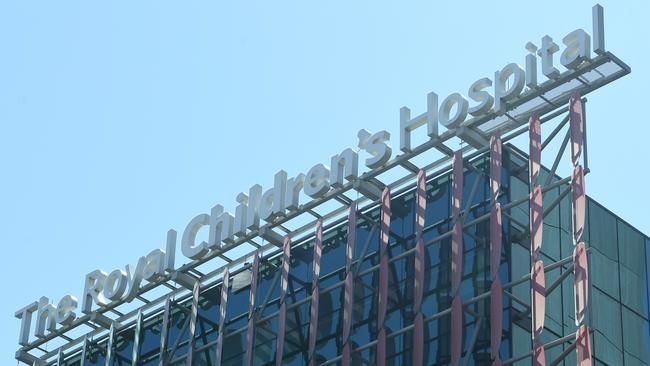Children crowding gender clinics may be ‘just tip of iceberg’
Melbourne’s Royal Children’s Hospital defends gender clinic amid questions over safety and ethics of risky medical treatment.

Melbourne’s Royal Children’s Hospital has come to the defence of its gender clinic after five months of silence amid intense questions about the safety and ethics of risky medical treatment.
An open letter from RCH chief executive John Stanway and chairman Rob Knowles said the clinic led by paediatrician Michelle Telfer was “one of the world’s best” and its 2018 treatment guidelines had been “peer- reviewed at the highest level”.
The letter said treatment of children and teens who identified as transgender was “based on the best available medical evidence” and given under “strict clinical governance standards”.
Children as young as 10 are being put on puberty blocker drugs to halt growth of “distressing” sex characteristics such as breasts, followed by cross-sex hormones, with Dr Telfer pushing for a start to double mastectomies at RCH for under-17s.
New referrals were up 20 per cent in the six months to July, with the clinic expecting to reach a record 300 this year, a potential increase of 1567 per cent since 2012, when Dr Telfer took charge.
Sydney psychologist Dianna Kenny, who has warned of irreversible harm from trans medicalisation of youth, said the RCH letter failed to mention growing global concern among practitioners, the role of social contagion in a surge of teenage patients, or the regretful young adult “detransitioners” who complain clinics had skated over the health risks.
“It’s a motherhood statement with no detail,” Dr Kenny said.
Western Sydney University’s professor of paediatrics John Whitehall, whose call for a broad parliamentary inquiry into trans youth medicine has been backed by more than 200 doctors, said the RCH statement ignored evidence suggesting hormone treatment might damage the still-developing brains of young people.
Citing the RCH claim it welcomed scrutiny, Dr Whitehall said: “Let the public know what you are actually saying to patients and parents about these (cognitive) complications”.

The RCH treatment guidelines have come under international criticism for overplaying empirical evidence and lacking caution.
The guidelines, and Dr Telfer’s expert evidence, are credited with persuading the Family Court in 2017 that new “advances in (trans) medical science” justified a relaxation of supervision by judges of hormone treatment decisions for under-18s.
Tip of the iceberg
Meanwhile, in a new BMJ Open paper on a longitudinal study Trans20, begun by RCH in 2017, researchers have admitted “an urgent need for more evidence” about trans medical care.
The authors, including Dr Telfer and her three RCH co-writers of the treatment guideline, say current numbers in crowded gender clinics “may be just the tip of the iceberg”.
They acknowledged treatment was “relatively new”, conceded clinicians needed the guidance of “stronger empirical research data” and predicted Trans20 would give information “about the long-term safety and outcomes of different forms of medical interventions available to them”.
American endocrinologist Michael Laidlaw, a critic of the “affirmative” approach, said the Trans20 paper showed “an experiment is already being conducted on children”.
The Trans20 study does not test the affirmative treatment RCH has been doing for years against any other kind of therapy.
“Why is there no comparison with psychotherapy, cognitive behavioural therapy, or watchful waiting?” Dr Laidlaw said.
Rival-free studies
A contentious long-term study of puberty blockers at London’s Tavistock NHS youth gender clinic was initially refused approval, the BBC Newsnight program reported in September.
An ethics committee protested that the decision of researchers not to randomly allocate some patients to a group getting no treatment meant the effects of the blocker drugs could not be proven.
The researchers argued too many teenagers would go abroad for blockers rather than risk ending up in a non-treatment control group, and got the go-ahead for the 2011-19 study from a second ethics committee, as the rules allowed.
In a letter this month to BMJ Open, professor of primary care research Richard Byng and emeritus obstetrics professor Susan Bewley said: “By gaining permission to study individuals without controls or piloting procedures for a (no doubt complex) randomised trial, an opportunity to determine harms and benefits was missed.
“The changing and growing demographic (of patients at youth gender clinics) — mainly natal females with high rates of trauma — make the need for proper studies more urgent.”
A US study begun in 2016 and involving five children’s hospital gender clinics also “observes” existing trans medical treatment without testing it against alternatives.
It is led by physician Johanna Olson-Kennedy, director of the clinic at Children’s Hospital Los Angeles, where there are 1500 active patients, and trans-identifying girls as young as 13 have been referred for double mastectomy.
In a July paper, Dr Olson-Kennedy and co-authors said the purpose of the study was to collect “critical data on the existing models of care for transgender youth that have been used in clinical settings for close to a decade.”
Treatment is puberty blockers, followed by cross-sex hormones, and the minimum age for inclusion in the study was lowered to eight.
The maximum follow-up is 24 months — some clinicians believe regret may take up to 10 years to show itself — and the drop-out rate for patients in the study was running at 12 per cent, potentially masking detransitioners.
The researchers said the study had the “capacity to substantially expand treatment across the country by providing rigorous evidence to demonstrate the benefits of early treatment.”
Canada has also launched an observational study of teenagers referred for puberty blockers or cross-sex hormones at ten clinics.
“While these treatments are generally considered safe, there is very little research on the short- and long-term social and medical experiences and outcomes of youth undergoing clinical care,” says the website for the 2019-21 Trans Youth CAN! study.
There is no mention of any alternative treatment — such as cognitive behaviour therapy — to be studied as a comparison to the medical interventions already favoured by clinics.
“We are an observational cohort study, not a treatment study, so there are no study drugs given or even study procedures (eg bloodwork) done as part of the study,” principal investigator Greta Bauer told the Canadian Gender Report group.
“We are gathering data from the youth and families for two years as they undergo the same care they would have received had they not been in the study.”
Like RCH, the Tavistock, US and Canadian clinics follow the pro-trans “affirmative model”, and medical procedures adapted from a Dutch clinic’s protocol.
Role for social contagion
The BMJ paper on Melbourne’s Trans20 study cited research, usually dismissed by the affirmative model, that, historically, most children at odds with their body grew up to accept it.
The paper also suggested greater community acceptance of trans identity might explain only “in part” the dramatic increase in teenagers, disproportionately girls, ending up at gender clinics. This left open a role for social media and peer influence, something the “affirmative” model tends to reject outright as incompatible with teen “expertise” on their “inner” trans identity.
Most of the eight authors of the BMJ paper have ties to Melbourne’s Murdoch Children’s Research Institute. Dr Telfer and her three RCH colleagues also have affiliations with that institute, which is involved in the Trans20 study.
The paper estimated 83 per cent of 600 patients in the Trans20 study would stay to the end, meaning as many as 17 per cent could drop out, with the regret of detransitioners not recorded. RCH relies on overseas studies with a claimed regret rate after transition of less than 1.0 per cent, suggesting detransitioners profiled in the media are often not “true” cases because they were pressured by family or religion.
The BMJ paper does not state eligibility rules for treatment at RCH, making it unclear how cautious those rules are.
Dr Telfer in October told a conference that The Australian’s reporting of concerns about trans medicine was “driven by fear and hate” with the aim to “progress a particular religious and political agenda”.
She did not reply when asked what this agenda was.
The Australian sought interviews with RCH leadership.
"These are adult decisions that we're asking children to make."
— Sky News (@SkyNews) December 12, 2019
Trans woman @DebbieHayton argues children shouldn't be able to medically transition while LBGTQ+ campaigner @jamie_windust says receiving medication isn't a simple process.
Full story here: https://t.co/Cku9UVosJ2 pic.twitter.com/xDbgnAaq8u



To join the conversation, please log in. Don't have an account? Register
Join the conversation, you are commenting as Logout